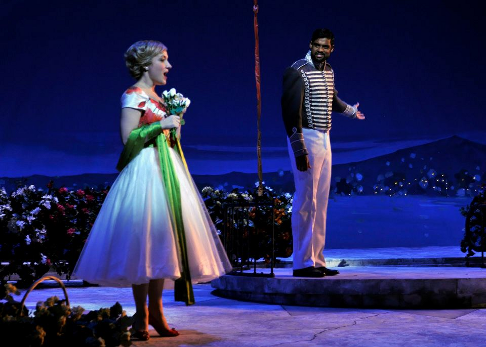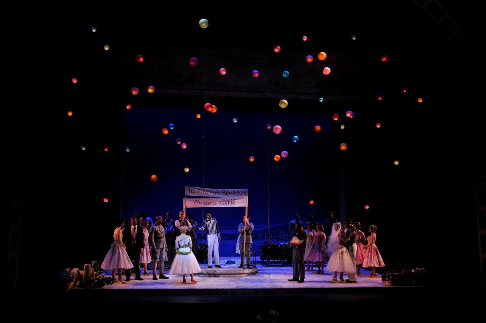27 Oct 2011
Béatrice et Bénédict, Opera Boston
How is one to write a Romantic opera?

How is one to write a Romantic opera?
It is a question that Berlioz, to his frustration, never quite answered. In his youth, bel canto held the stage, and the tone was set by Rossini and Bellini; by his maturity, grand opera and its rather different conventions had taken over. How was a composer of the highest aspirations to structure a work that was to give rein to experience and perception? The reliable but chilly structures of the Baroque and the da capo aria, with its implied assurance that the world was to return to the given social order, just as the singer was bound to return to the first melody, were not going to prove satisfactory; the very different example of the opera-comique in France, with its bumptious mixture of popular entertainment and cultivated composition was, for a composer like Berlioz, little inspiration. The failures of Schubert’s Fierrabras and Schumann’s Genoveva as dramatic vehicles functioned as a kind of warning, and the silence of Brahms — his profound disinterest in writing for the stage — was instructive. Only Weber’s Freischutz, and, to a lesser extent, his Euryanthe and Oberon, established and retained places on the international stage, and in the allegiances of popular and learned auditors.
By the time Berlioz wrote Béatrice et Bénédict, he had endured a lifetime of frustration and misunderstanding in opera. No composer has ever loved drama more, or more instinctively, than Berlioz, yet he had the greatest difficulties — many self-imposed — in creating vehicles that played as drama. Benvenuto Cellini is a mess of color and action; La Damnation de Faust, despite recent efforts by the Metropolitan Opera, is almost inert dramatically; Les Troyens is a magnificent masterpiece, but long, unwieldy, and intermittently static. Beatrice and Benedict, which he wrote in the early 1860s, is an odd creation by almost any standard. The story, extracted by Berlioz himself from Shakespeare’s Much Ado About Nothing, is a light, almost eventless romantic comedy. The heart of Much Ado is a fundamentally misogynistic tale of deception and wronged virtue: Claudio is suborned by Don John into believing that his betrothed, Hero, has been untrue to him. These unhappy lovers, on their winding way back to the altar, are accompanied by the low-comedy antics of the local constabulary, and, most of all, by Hero’s cousin Beatrice and Claudio’s boon companion, Benedick, whose repeated slanging matches signal, to everyone but themselves, a deep underlying sexual tension and romantic affection. These two have long since crowded the disquieting principal plot, which is a story only an academic could love — as long ago as the 1630s, King Charles I titled his copy of the play Beatrice and Benedict. Berlioz simply discards all the pesky business — gone Don John, gone denunciations at the altar, gone Dogberry and the antics of the police; welcome a slight and forgettable bit of new business with a newly-devised character, the music-master Somarone (“Big Ass”). The trouble here is that without even a hint of shadow — all Claudio and Hero do is to egg their friends on, while the nuptials approach — there is very little narrative drive. It does not come as much of a surprise to learn that Berlioz planned the work as a one-act opera, and extended it; the music of the two-act version is consistently rewarding, but dramatically almost as inert as his Faust. Berlioz’s thinking here is orchestral, and almost symphonic — Béatrice et Bénédict is, arguably, a symphony or tone poem on themes from Shakespeare, with voices. As such, it is among Berlioz’s most appealing works: the duet-nocturne that closes the first Act, perfectly performed by Opera Boston, is arguably one of the most beautiful episodes in all of opera.
 Julie Boulianne as Béatrice and Sean Panikkar as Bénédict [Photo courtesy of Opera Boston]
Julie Boulianne as Béatrice and Sean Panikkar as Bénédict [Photo courtesy of Opera Boston]
For all his superior mastery of more complex forms and ideas, Beethoven, Berlioz’s great musical model, could only wish he had written ten more beautiful minutes. Opera Boston, a laudable champion of the neglected and under-heard in opera, has essayed a fluent, elegant staging of Berlioz’s last stage work. The setting is still Sicily — or, that sort of neverland Shakespeare always evokes in his comedies — but resituated in a high-toned 1950s, complete with puffed skirts, bobs, and up-dos — you almost expect a poodle-skirt to sashay in. Designer Robert Perdziola’s set design is equally stylish — the capolavoro is perhaps the lifting of set’s back wall, mottle-painted to suggest aging stucco, to reveal a heart-stopping night sky and distant harbor. As Beatrice, Julie Boulianne has a fine mezzo-soprano voice, a little hard-toned in the upper reaches; Sean Panikkar as Benedict lacked a little polish and finish in tone. Heather Buck’s Hero was excellent at the top and bottom of her register, but a little elusive at times in the middle. Kelley O’Connor as Ursule almost stole the evening, with an arresting, dark-colored low-mezzo voice. Gil Rose’s orchestra offered a seamless and idiomatic reading of Berlioz’s tuneful score. Director David Kneuss, a long-time advocate of the work, decided on an odd hybridization of languages and styles — the sung score was heard in Berlioz’s French, the dialogue in English, in an adaptation that mixed Shakespeare, Berlioz’s own additions for the French-language premere in 1863, and what was apparently some of Kneuss’ own work. Although the result was not as jarring as might have been feared, why not go all the way in any one of these directions? Shakespeare, with minimal alterations? modern English for everything? French for all? Kneuss also did not entirely solve Berlioz’s dramaturgical problems, perhaps a thankless task on the best of days. Principals and chorus were frequently perfectly stationary in moments that, musically and dramatically, suggest movement (the opening of Act I; the drinking song in Act II) — but then, to be fair, Berlioz always had peculiar ideas about what constituted a party.
 Finale [Photo courtesy of Opera Boston]
Finale [Photo courtesy of Opera Boston]
Beatrice and Benedict was not quite his last work — the Memoirs were to follow — but is arguably his last musical work of any importance. Like Verdi long after him, he said farewell to the stage, and to some degree to music, with comedy — and comedy from Shakespeare, at that. He lacked Verdi’s Boito — he had no librettist of genius to help shape the drama, and provide a loving but stern pair of eyes to look over the work. Why this work — and why this curious selection from Much Ado? Shakespeare had long been both his inspiration and his undoing; it was through Shakespeare that he found himself as a composer of genius, and it was through Shakespeare that he met Harriet Smithson, the English actress he loved and married. Their relationship declined into mutual loathing and recrimination — but in this bagatelle on Shakespearean themes, we see a merrily quarrelling couple, Beatrice and Benedict, whose loving combat never degrades into hatred. They are Hector and Harriet, without the depredations of age or misfortune. When it premiered, Verdi’s Forza del Destino opened in Imperial Russia; Offenbach’s Belle Helene was in preparation, and Meyerbeer’s Africaine was being completed; most of all, Wagner’s Walkure had just appeared at Bayreuth. Aesthetics very different from Berlioz’s, although perhaps similar in ambition, had arisen; yet this last and most polished and mature work from the pen of Berlioz deserved and deserves to be heard. Opera Boston’s commendable production, with its polished style and fine young singers, goes a long way toward keeping Berlioz’s music fresh and living for contemporary audiences.
Graham Christian